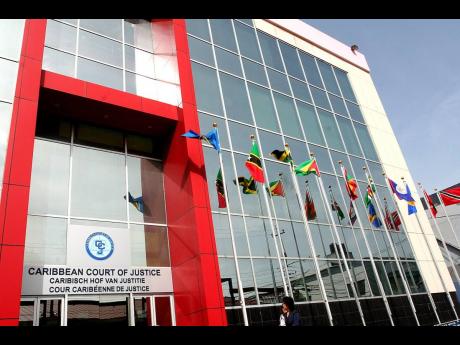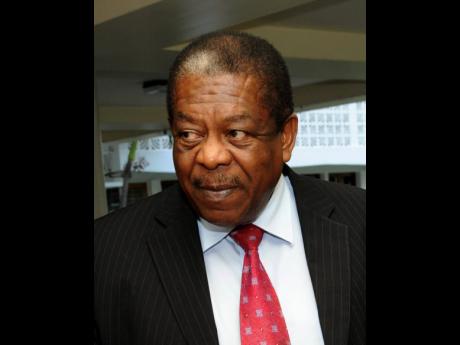Dennis Byron | Significance of the CCJ for Jamaica
It is a historical fact that Britain extended written constitutions to its former colonies when they attained independence. A feature of these constitutions is that they specifically declare that the Constitution is the Supreme Law with which other laws must be compliant. Ironically, Britain never had a written constitution, and its fundamental law was based on the premise of parliamentary sovereignty.
In countries with a written constitution courts are required to ensure that laws passed by parliament are compliant with the constitution. In Britain, the courts have no such duty or power and must apply any law passed by Parliament.
This is a major conflict between our respective judicial systems. In Commonwealth Caribbean countries, the Constitution confers on the courts a supervisory power over the content of laws enacted by parliament. In Britain, the courts do not have any supervisory power over the content of laws enacted by Parliament. Simply put, in the Caribbean, we have the supremacy of the Constitution while in Britain there is the sovereignty of Parliament.
The Caribbean constitutions manifest a deliberate legislative intent to impose a check on the sovereignty of Parliament that exists in Britain. Thus, the independence constitution took a different constitutional path from the road on which Britain travels.
The difference between these approaches was visibly demonstrated in their approaches to the interpretation and application of the “savings clause” in the Caribbean constitutions.
There are two types of savings clauses i) that seek to limit judicial review of punishments or treatment authorised by any law enacted before the Constitution came into force and ii) to protect all pre-independence or colonial laws from constitutional challenge. This broader savings clause is in the Constitution of Jamaica. The almost uniform approach adopted to bring these constitutions into force, including in Jamaica, was that the orders bringing the constitutions into force included the mandate that the laws in existence when the constitution came into force “shall be read and construed with such modifications, adaptations, qualifications and exceptions as may be necessary to bring them into conformity with the Constitution.”
The CCJ considered that the judiciary in independent countries must give effect to the mandate to read and construe the existing legislation to bring them into conformity with the constitution. The Privy Council adopted a contrary view that the principle of legal certain which informed the savings clause required that the existing laws should be given effect without any modification and that the power of bringing them into conformity with the constitution could only be exercised by Parliament. This is the difference between constitutional supremacy and parliamentary sovereignty.
DEATH PENALTY
On subject area affected by the savings clause was the mandatory death penalty, which both the CCJ and Privy Council agreed contravened the fundamental rights provision of the constitution. The position of the Privy Council is in Chandler para 97:
“In the Board’s view, the 1976 Constitution [of Trinidad and Tobago] saves existing laws, including the mandatory death penalty, from constitutional challenge. The consequence of that is that the state of Trinidad and Tobago has a statutory rule which mandates the imposition of a sentence, which will often be disproportionate and unjust. The sentence is recognised internationally as cruel and unusual punishment. The state does not dispute that characterisation. The 1976 Constitution leaves it to the President, having received ministerial advice, to substitute a less severe form of punishment in an appropriate case by exercise of the powers in section 87 of the Constitution.”
To make a similarly brief description of the position of the CCJ, I refer to Nervais v R [2018] 4 LRC 545; [2018] CCJ 19. My judgment in this matter was the last before my retirement. Look at matters expressed in paragraphs 59 and 63:
[59] It is incongruous that the same Constitution, which guarantees that every person in Barbados is entitled to certain fundamental rights and freedoms, would deprive them in perpetuity from the benefit of those rights purely because the deprivation had existed prior to the adoption of the Constitution. …
[63] Section 4 (1) of the Independence Order prescribes a mandatory direction to construe the existing laws to bring them into conformity. The method of bringing into conformity is not limited to modification and adaptation, but it includes the wide powers of qualifications and exceptions. No existing law is excluded from the requirement of being brought into conformity…
The difference is clear. The Privy Council while recognising that the legislation deprives the citizen of fundamental rights ruled that the courts were stopped from affording protection, and that the deprivation must remain until remedied by the executive or legislature. The CCJ took the view that the court had to interpret and apply the Constitution to ensure that the citizen benefited from the fundamental rights it guarantees without waiting for the executive or legislature.
More than half a century after independence. The non judicial arms of government have not removed the inherited colonial laws which contravene the human rights provisions in the constitution. Should the role of the Caribbean court be defined by the British Constitutional lawyer or judge whose perspective is fundamentally different from that of the Caribbean man? I close with the concluding paragraph of Chandler:
“98. Laws, which predate the creation of the 1976 Constitution and, but for the savings clause, would be exposed to constitutional challenge for breach of the fundamental rights and protections in section 4 or section 5 of the Constitution, will continue to exist only so long as Parliament chooses to retain them. It is striking that there remains on the statute book a provision which, as the government accepts, is a cruel and unusual punishment because it mandates the death penalty without regard to the degree of culpability. Nonetheless, such a provision is not unconstitutional. The 1976 Constitution has allocated to Parliament, as the democratic organ of government, the task of reforming and updating the law, including such laws.”
SIGNIFICANCE OF CCJ TO JA
All member states that signed the agreement establishing the CCJ, have acceded to the original jurisdiction of the Court this includes including Jamaica. In this aspect of its work, the CCJ is a major tool for Jamaicans and Caribbean citizens in general to realise the promise of regional economic growth and social stability that have been linked to the CSME. Jamaican citizens have already benefited from the exercise of the original jurisdiction of the CCJ. (the Shanique Myrie case – and freedom of movement throughout CARICOM).
In the appellate, even litigants without financial means are able to access justice as well. In this context we often refer to the case of Ross v Coreen, involving a dispute between two very poor ladies (one quite aged) from Guyana. They could never previously have had that matter litigated by a second-tier appellate court. The CCJ heard it in under a facility provided by its rules to assist impoverished parties, with the cooperation of the Guyanese Bar providing pro bono service.
The CCJ has not only been accessible but also innovative in protecting human rights. Two examples:
i) In the Attorney General and Others v Joseph and Boyce the Court was accessed and applied the principle of legitimate expectations, in relation to a Treaty right which had not been incorporated into domestic law, to stay the execution of a convicted murdered while his application to the Inter American Human Rights Commission, was pending.
ii) In terms of excessive duration of pre-trial detention, in Romeo Da Costa Hall v The Queen, the CCJ clarified the circumstances under which credit should be granted for time spent on remand.
iii) The Court has also contributed to the concept of public accountability and good governance. the decision Florencio Marin v the Attorney General of Belize addressed a questionable transaction involving government ministers whereby prime government land was sold to a private company beneficially owned by one of the ministers at prices well below market value ruling that in addition to traditional criminal and other punitive sanctions, another avenue is now available to address corruption and wastage of public funds in the civil action to recover damages brought by the Attorney General for the tort of misfeasance.
However, the impact of the Court extends beyond its work its judgments. The Court is committed to enhancing the performance of the region’s judicial system. The Caribbean region is witnessing an explosion of litigation resulting in backlogs and delays which if not properly managed will erode public confidence in the judicial system. This is where the umbrella bodies of the CCJ, the CCJ Academy for Law and the Caribbean Association of Judicial Officers (CAJO) come in. The main objective of CCJ Academy is the advancement of knowledge, education, learning, research, and practical application of law and the administration of justice in the Caribbean context. While CAJO is a prime vehicle for judicial education in the region. The Privy Council which plays a similar role in England does not do so in the Caribbean. It is left to the CCJ to strengthening of the administration of justice throughout the region.
The Court also contributes to the development of legal expertise in the region. The number of senior counsel and junior counsel appearing before the CCJ in the matters continues to increase each year. In those jurisdictions that have acceded to the appellate jurisdiction, the opportunity to appear before the highest appellate court is of immeasurable benefit from the standpoint of professional development of legal practitioners. Increasing access to justice is beneficial for both personal and normative reasons.
Thus, if we examine the full impact of the CCJ on the region we can see that in both its appellate and original jurisdiction, the Court is able to effect positive change in the social order of Caribbean societies by delivering justice which is accessible, efficient and reflective of our values and mores. By strengthening the judicial system the Court also contributes to an economic climate that fosters increased growth and investment.
Sir Dennis Byron is the former president of the Caribbean Court of Justice; this two-part article is from his speech delivered at the launch of The Roadblock: Jamaica’s Resistance to the Caribbean Court of Justice. Send feedback to columns@gleanerjm.com


